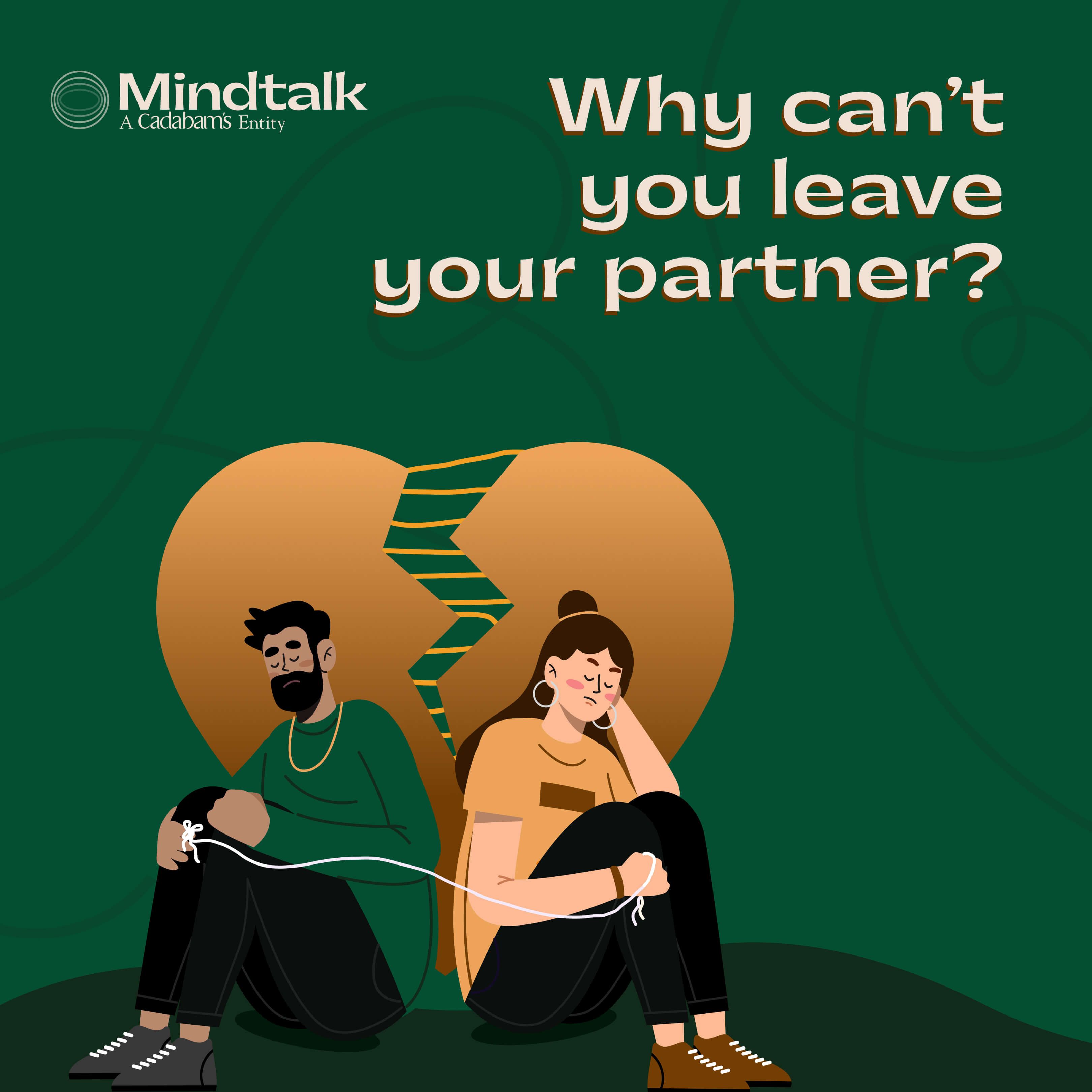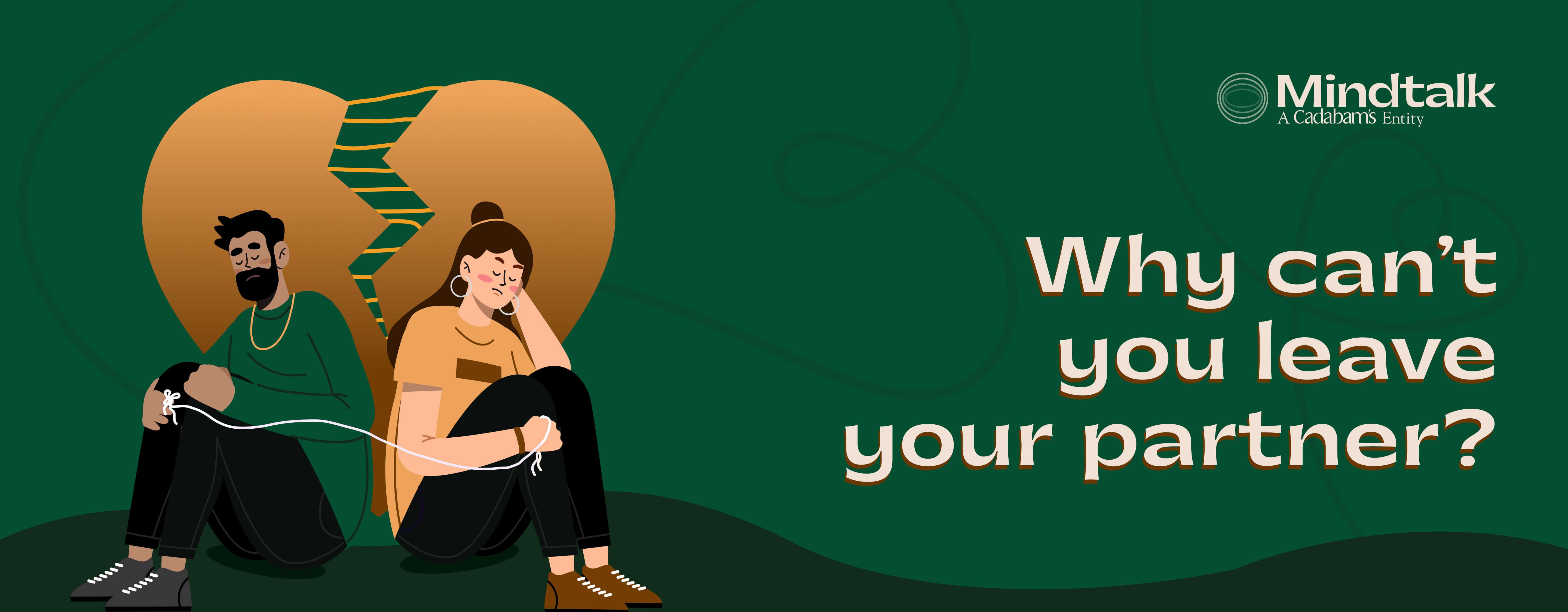Why Can’t You Leave Your Partner?

Why Can’t You Leave Your Partner?
As painful as it is, sometimes the only solution to a happier life is leaving your partner. From not feeling valued to making multiple failed attempts to fix the relationship, several factors can lead to separation. We understand that on some days all you may think about are the what-ifs.
- What if I don’t find anyone else?
- What if I regret the decision?
- What if they are the one?
- What if I hurt their feelings?
The anxiety and uncertainty that builds within can make you justify the relationship and stay committed. After all, you are choosing between staying committed or letting go.
What Makes You Stay?
Now, before we talk about making that final decision, let us understand why you may hesitate so much when it comes to calling it quits.
Attachment styles: The relationship between you and your parents or primary caregivers plays a significant role in how you perceive and approach future relationships. Since it is the first relationship you experience it helps you set expectations and relate to other people throughout your life. A healthy and attentive relationship contributes to secure attachment styles. On the other hand, an unhealthy one leads to insecure attachment. The insecure attachment styles include-
- Anxious/Preoccupied: Not being able to live without a partner, experiencing severe anxiety, and a loss of identity in the absence of a partner, are signs of an anxious attachment style. This may look like clinginess, but it is a lot more than that which is why it might be hard for you to leave your partner.
- Disorganized/Fearful-Avoidant: If you enjoy moments of intimacy but only to a certain extent as sometimes this might make you feel suffocated, you may relate to the disorganized/fearful-avoidant attachment style. Battling these opposing emotions can make you feel confused when it comes to ending a relationship.
Lack of Support: Feeling safe amongst people other than your partner (friends, loved ones, colleagues) goes a long way in having the courage to leave a relationship. If you are struggling with feeling alone, you may hold on to your partner with the hope of things changing for the better. In addition to this, financial dependency, lack of mental health care, and more can contribute to the struggle of separation as well.
Fear of Abuse: Leaving an abusive relationship is easier said than done. For many of us, separation may entail severe forms of abuse that can be life-threatening to them and their loved ones. This can look like physical, sexual, emotional, financial, or verbal assault. Hence we tend to stay for the safety of ourselves and the children, the lack of resources, and the hope for change and reconciliation.
How Does Staying In An Unhappy Relationship Affect You?
Being Indian, we pride ourselves on the importance of staying committed to our partners. This mentality when passed on across generations only reinforces the causal factors which in the long run lead to severe physical and mental health issues. Common consequences include-
- Physical impact: Poor sleep, cardiovascular conditions, high blood pressure, headaches, digestive issues, and weakened immune system.
- Emotional impact: Panic/anxiety attacks, depression, low self-esteem, fear, and addiction.
- Social impact: Withdrawing from your community, lying to your loved ones, decreased drive, and poor performance.
How Can You Get Out Of An Unhappy Relationship?
Despite the fear and resistance that comes with leaving a relationship, sometimes we may just have to bite the bullet and end things. But how?
- Acknowledge that it's never an easy process: There is no easy or pain-free way to break up. Hence it is important to understand and accept the grief that follows a breakup as this will help us stay prepared.
- Be honest and empathetic: While being brutally honest does the job, it may not always lead to the best outcome. So when we address the separation, it is essential to be clear about our needs and feelings while creating a safe space that respects and acknowledges theirs
- Avoid blaming or shaming each other: We tend to get defensive when we address the shortcomings of our relationships. This causes us to create a so-called enemy persona of our partner. Placing blame or shaming the partner can only escalate the situation making the break-up a more taxing process.
- Give yourself time to grieve: One of the most challenging aspects of breaking up is the pain and sorrow that follows it. Regardless of who ended the relationship, we are all bound to experience grief. In such situations, it is important to patiently remind ourselves of our needs and why we chose to end things. Taking the time to relax, discover new hobbies, and more can also go a long way in coping.
- Therapy: When we are at crossroads between staying or leaving a relationship, seeking help from a mental health practitioner will provide us with the needed clarity to make the right decision and cope with its aftermath. Therapy does not have to be limited to individual sessions. With support groups gaining popularity, finding people who are on the same journey of choosing to leave and heal from a relationship can give you the confidence you need.
Deciding to leave is one of the most difficult challenges we may face, but sometimes it is the only option we have. Hence it is important to remind ourselves to keep our needs on top priority and work towards building a safer and healthier space for our mental health.











